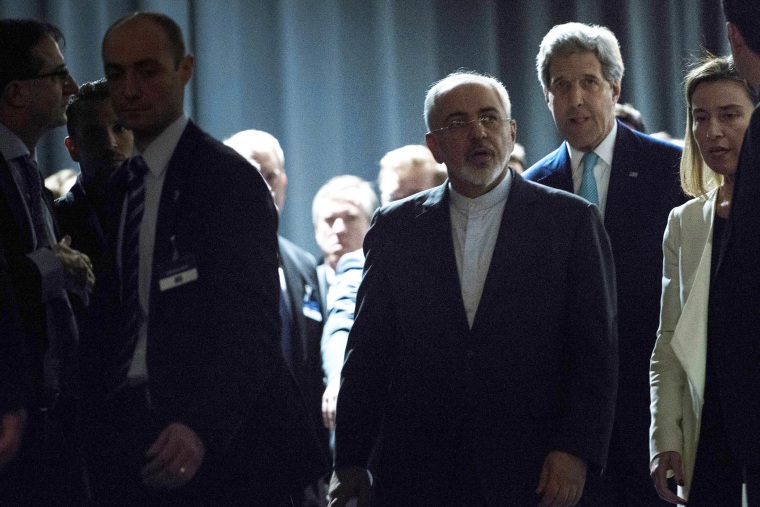President Obama announced nearly a month ago that a diplomatic framework is now in place to curtail Iran's nuclear program, which drew condemnations from most of the White House's Republican critics. A domestic public-relations race quickly took shape: which side of the divide would the American mainstream believe? Those celebrating an international breakthrough or those convinced the deal represents dangerous appeasement?
There's usually no denying the efficacy of the GOP message machine, but despite its best efforts, Republicans just aren't having any luck persuading most Americans.
A solid majority of American voters back President Barack Obama's interim nuclear deal with Iran, a poll by Quinnipiac University showed Monday. Some 58 percent of voters back the outline deal, which would curb Iran's atomic program for more than a decade and subject Tehran to tough inspections.
After months of fierce criticisms from the right -- along with sabotage stunts and an unprecedented partnership with Israeli Prime Minister Benjamin Netanyahu to derail American foreign policy -- this poll found that only a third of the public opposes the preliminary agreement. And despite repeated calls from far-right hawks for a military confrontation with Iran, the same survey found that 77% of Americans prefer "a negotiated settlement to the nuclear crisis rather than military intervention."
In these divisive times, 77% of the country doesn't agree on much, especially on contentious issues involving national security, but that's the percentage of Americans who now disagree with Sen. Tom Cotton (R-Ark.), Bill Kristol, John Bolton, and their cohorts.
Obviously, no one poll should be considered the definitive take on public opinion, but this new Quinnipiac data is consistent with three other major independent polls released over the last month or so.
The fight over public opinion may be effectively over -- the right is losing -- but the broader political dynamic remains unresolved.
Remember, nearly every Republican presidential candidate is running on a platform that not only condemns the popular diplomatic process, but GOP candidates are also vowing to undo any international agreement the president strikes, even if it alienates U.S. allies abroad.
And why would national Republican candidates so brazenly ignore the public's wishes? Perhaps because of the fine print in the Quinnipiac poll: while most Americans in general support the White House's approach and reject the GOP line, the same survey found that most Republican voters oppose nuclear diplomacy with Iran.
In other words, conservative White House hopefuls have to ignore what the country wants, at least for now, in order to side with the GOP's far-right base. It's the kind of move that leads to general-election risks, but at least for now, Republican candidates probably don't think they have much of a choice.
At the same time, as we discussed several weeks ago, much of the political world doesn't seem to understand that President Obama is actually winning the p.r. fight. Josh Kraushaar, a National Journal conservative, recently argued that Obama is dangerously “ignoring public opinion,” willing to “bypass public resistance” to P5+1 diplomacy. Around the same time, Sen. Ted Cruz (R-Texas) expressed dismay that the White House is “circumventing the will of the American people,” while former Gov. Jeb Bush (R) added that “public opinion” is not on Obama’s side.
All of this is backwards. To date, there are exactly zero independent public-opinion surveys showing U.S. opposition to the diplomatic talks. Americans may be skeptical about the eventual outcome, but support for the effort is overwhelmingly on the White House’s side.
Many in Congress are still weighing their options, looking for possible ways to destroy the international talks. To the extent that lawmakers care what the public thinks, American support for Obama's policy should influence the course of the debate.
